DISRUPTIVE SUPPLY CHAIN INNOVATION WITH MANISH KAPOOR | E042 PODCAST
LISTEN TO THIS EPISODE
ABOUT THE GUEST
Manish Kapoor is the founder and CEO of Advatix, a global leader in supply chain, logistics, and fulfillment operations. Prior to founding Advatix, Kapoor had a distinguished career in leadership roles at major companies like Amazon and FedEx. At Amazon, he played a key role in the creation of Amazon Logistics (AMZL) and led the global launch of initiatives such as Amazon Fresh and Sunday Delivery. He is credited with transforming the last-mile delivery landscape through innovation and operational excellence.
Kapoor’s extensive career spans over 25 years, during which he has consistently led disruptive innovations in the logistics and supply chain sectors. He created the first centralized command and control center for last-mile logistics at FedEx, which was a revolutionary step in the industry. His work has helped companies optimize their supply chains and achieve significant growth.
Kapoor's entrepreneurial journey is inspired by his family’s four generations of business ownership. He holds a Master’s in Supply Chain Strategy and Management from MIT, an MBA from Babson College, and a Master of Science degree from Rochester Institute of Technology. Kapoor launched Advatix to provide companies with real, on-the-ground operational support, blending strategic expertise with practical execution, which has proven highly successful for many of his clients.
Advatix’s mission is to help businesses accelerate growth by optimizing supply chain and logistics operations, making them more competitive and efficient in today’s fast-paced eCommerce environment
Advantix’s Website:
https://www.advatix.com/team
Manish’s LinkedIn:
https://www.linkedin.com/in/manishkapoor2/
George Stroumboulis sits down with Manish Kapoor in Newport Beach, California on the Invigorate Your Business Podcast to talk about all things technology, disruptive innovation, global logistics, education and so much more.
“My inspiration was my dad, because he was in engineering school when he lost his dad and he had four younger siblings to take care of and he couldn’t finish his engineering. So it was his dream for me and my sister to to finish his dream.”
MEDIA RELATED TO THE EPISODE
George Stroumboulis sits down with Manish Kapoor in Newport Beach, California on the Invigorate Your Business Podcast to talk about all things technology, disruptive innovation, global logistics, education and so much more.
George Stroumboulis sits down with Manish Kapoor in Newport Beach, California on the Invigorate Your Business Podcast to talk about all things technology, disruptive innovation, global logistics, education and so much more.
George Stroumboulis sits down with Manish Kapoor in Newport Beach, California on the Invigorate Your Business Podcast to talk about all things technology, disruptive innovation, global logistics, education and so much more.
George Stroumboulis sits down with Manish Kapoor in Newport Beach, California on the Invigorate Your Business Podcast to talk about all things technology, disruptive innovation, global logistics, education and so much more.
George Stroumboulis sits down with Manish Kapoor in Newport Beach, California on the Invigorate Your Business Podcast to talk about all things technology, disruptive innovation, global logistics, education and so much more.
George Stroumboulis sits down with Manish Kapoor in Newport Beach, California on the Invigorate Your Business Podcast to talk about all things technology, disruptive innovation, global logistics, education and so much more.
ABOUT THE “INVIGORATE YOUR BUSINESS” PODCAST
The Invigorate Your Business with George Stroumboulis podcast features casual conversations and personal interviews with business leaders in their respective fields of expertise. Crossing several industry types and personal backgrounds, George sits down with inspiring people to discuss their business, how they got into that business, their path to the top of their game and the trials and tribulations experienced along the way. We want you to get inspired, motivated, and then apply any advice to your personal and professional lives. If there is at least one piece of advice that resonates with you after listening, then this podcast is a success. New episodes weekly. Stream our show on Spotify, YouTube, Apple, Amazon and all other platforms.
ABOUT GEORGE STROUMBOULIS
George Stroumboulis is an entrepreneur to the core, having launched several ventures across multiple industries and international markets. He has held senior-level positions at progressive companies and government institutions, both domestically and internationally, building an extensive portfolio of business know-how over the years and driving profit-generating results. George’s ability to drive real change has landed him in several media outlets, including the front page of the Wall Street Journal. George was born in Toronto, Canada to his Greek immigrant parents. Family first. Flying over 300,000 miles a year around the world puts into perspective how important family is to George’s mental and emotional development. With all this travel to global destinations, the longest he stays even in the most far-out destination is 3 days or less - a personal rule he lives by to make sure he is present and involved in family life with his wife and three daughters. To read about George’s global travels, stay connected with his blog section.
STAY CONNECTED WITH GEORGE STROUMBOULIS
STREAM & LISTEN TO THE PODCAST:
SPOTIFY: https://open.spotify.com/show/1rW2CmxQoiJNEPOZupJlvd
YOUTUBE: https://www.youtube.com/user/Stroumboulis
APPLE iTUNES: https://podcasts.apple.com/us/podcast/invigorate-your-business-with-george-stroumboulis/id1607693240
AMAZON MUSIC: https://music.amazon.com/podcasts/8fc03929-71b3-483a-a64e-153e30b3d462/invigorate-your-business-with-george-stroumboulis
STROUMBOULIS SITE: https://www.stroumboulis.com/podcast
PODCAST SITE: http://www.invigorateyourbusiness.com
FOLLOW GEORGE STROUMBOULIS:
INSTAGRAM: https://www.instagram.com/georgestroumboulis/
YOUTUBE: https://www.youtube.com/user/Stroumboulis
LINKEDIN: https://www.linkedin.com/in/Stroumboulis/
TWITTER: https://twitter.com/Stroumboulis
FACEBOOK: https://www.facebook.com/georgestroumboulis
TIKTOK: https://www.tiktok.com/@georgestroumboulis
CONTACT GEORGE DIRECTLY: https://www.stroumboulis.com/connect
FULL SHOW TRANSCRIPT
George Stroumboulis: 0:00
Welcome to another episode of Invigorate your Business with George Stroumboulis. Today, I sit down with Manish Kapoor. He is a global expert in the supply chain and logistics arena. He has worked for companies including Amazon and FedEx and part of the teams responsible for making same-day delivery a thing. We're going to dissect his new business. We're going to talk about what he's learned over the years, from studying at Ivy League schools to running his own operation with over 1500 employees around the world. Enjoy this episode starting now.
George Stroumboulis: 0:36
My name is George Stroumboulis and I'm extremely passionate about traveling the world, meeting new people and learning about new businesses. Join me as I sit down with other entrepreneurs to learn about their journeys. This episode of Invigorate your Business starts now, so we're going to jump into this. Okay. So we're at 1140. We got till 1225. You got to get out of here, okay.
George Stroumboulis: 1:05
So today I am sitting with Mr Manish Kapoor. He is the CEO, founder, the brains behind Advatix right, it's a global logistics supply chain company. I'm very happy to be sitting with you today. We go back probably seven years. That's right, right, and working with you and just learning what you're doing. And then your background is incredible just from an education standpoint intellect, companies you've worked with and services and products you've brought to market for brands like Amazon, fedex truly impressive, right. And then making the hard decision to say, okay, corporate America tremendous success. I'm going to start my own thing from scratch and I'm going to enter this entrepreneurship world Right and just put everything on the line and build this large international company with thousands of employees across the board and really taking the legacy from your family back in India multiple generations of entrepreneurs and stepping into this world right. Like it's a cool story. You are a very good person, really smart, so I'm glad that you're sitting here today with me.
Manish Kapoor: 2:08
It's good to see you. Thanks for having me here, George.
George Stroumboulis: 2:10
Absolutely appreciate it. Let's start high level. What does your company do?
Manish Kapoor: 2:14
Yeah, so after 25 plus years in supply chain working for large companies, including Amazon and FedEx and so on, we got on a mission to help young companies scale up, find some large companies improve their supply chains as well. At the heart of any company that produces products, whether it's going to retail stores or somebody's home, it's supply chain moving things, and we felt like there's so much opportunity and waste in the process, and so our mission is to help other companies really improve their supply chain yeah, and bring all the experience to that.
George Stroumboulis: 2:44
Well, and you say other companies, like you've helped companies that were not household brands at the time but now have become household brands. What are some of the companies that you've seen? From small scale to household names.
Manish Kapoor: 2:57
Yeah, some of those companies like Rent-A-Runway. We have Black Tux GoPuff, which scaled up nicely and actually acquired BevMo in this area and Beyond Meat and so on, and then eventually helped companies like Home Depot and General Motors launch their electric truck division as well.
George Stroumboulis: 3:13
Yeah, incredible. Go back to education. We're going to talk before we get into Amazon, fedex, what you did there. Go back to your education First of all. How important is it in your family and your culture when you studied right and then how that led into, like corporate America, a career here?
Manish Kapoor: 3:30
I think it's a known fact in Indian families. When you're growing up at least our generation there were only a few options Either you become an engineer or a doctor. Right, I picked the engineering path and engineering in India and then kept thinking about higher studies and that's why I came to the US to go to grad school. I got my master's and eventually an MBA after that. So education has played a big role and in my case it came from my dad's. My inspiration was my dad, because he was in engineering school when he lost his dad and he had four younger siblings to take care of and he couldn't finish his engineering he couldn't finish it he's still the smartest person that I know, and so it was his dream for me and my sister to to finish his dream.
Manish Kapoor: 4:14
Wow, and so both of us. My sister also has two masters. You know, that was our inspiration to to stay with as far as education is concerned so your father, uh lived in india, sent you and your sister here for school.
George Stroumboulis: 4:26
That's right so you studied here, so talk to me about your father. We're talking several generations in the printing business. That's right. Back in India, that's right, okay. So what's that like, growing up having a father in that space?
Manish Kapoor: 4:37
Absolutely. And you mentioned the entrepreneur. I became an entrepreneur only eight years ago. First, I became an entrepreneur only eight years ago. First of all, I admire other entrepreneurs because it's not easy as easy as it looks. So some mutual admiration for you as well. I've watched you grow as well. So, yeah, I grew up in my dad's print shop. Four generations of printers in the family got my engineering and printing, came to the US to do master's in print Wow, and spent first 10 years in the printing industry and then FedEx acquired Kinko's, which is now called FedEx office, and I was pulled into help with that acquisition right after that.
George Stroumboulis: 5:10
That was my first exposure to supply chain so you were over here working in print, so you got your master's in printing engineering that's right, okay. And then you came to the states and worked in that arena, right. And then FedEx pulled you in, which Kinkoo's became Office. That's right, okay. So what type of printing, like? When I hear printing now, I'm like is it going away, is it a dying, you know dinosaur type industry? What was the evolution from what you studied to where we're at today?
Manish Kapoor: 5:35
Yeah, we've heard for the last 20, 30 years. It's going away, but it's still here.
George Stroumboulis: 5:39
Right.
Manish Kapoor: 5:39
It is declining. Right with digital media and so on, the printing technology itself has shifted more towards digital. What that means is you're able to do short runs cost-effectively. With old technology you had to run, you know, thousands of copies. Now you can do one copy and still be cost-effective. So I spent 10 years in the check printing industry, believe it or not, and because checks were declining and my main focus was helping that industry adopt digital printing technology so you could produce fewer checks. So I got to work with Xerox to create the first digital magnetic toner-based printer with a postcard front end For checks, for checks. Oh wow, that's where I started. But then I finished my MBA and FedEx bought Kinko's. When I got pulled into that, mostly because of print, I joined FedEx and my boss says hey, can you handle trucks? Most people like I don't know. I actually welcome and invite such challenges and uh, and didn't know what I was getting into. What would like handle?
George Stroumboulis: 6:36
from what aspect? From from the logistics distribution side of it yeah.
Manish Kapoor: 6:39
So we had a us-wide fleet of trucks that we were using for deliveries and it needed to be improved, so I took it on. I did not have any experience, but that also meant I didn't have any baggage, which means clean slate. I started to question the basics like why are the trucks parked? They should be moving right, we're paying leases on this, and so on and so forth. That led to creating the first centralized dispatch in the US, so think of that as an air traffic control for trucks.
George Stroumboulis: 7:07
For trucks For FedEx, specifically For FedEx office.
Manish Kapoor: 7:10
Yeah, and so at that time, smartphones were not even out. So we wrote a driver app on a push-to-talk phone and started to hand those to the drivers A big change management challenge. And so I was watching my drivers on my screen. 15 years ago, when there was no smartphones, uber Lyft was not there. That technology was built and we started to manage the entire fleet from Plano Texas.
George Stroumboulis: 7:37
Through their phones you were able to track, geo track, basically where they're at.
Manish Kapoor: 7:41
And communicate with them. Let them know where the next stop was, what they're supposed to do. It started to digitize the workflow for the drivers.
George Stroumboulis: 7:48
So did you specifically spearhead that development of that technology, or was that something you proposed and then FedEx goes and tries to figure it out?
Manish Kapoor: 7:57
We actually had partner companies that helped build this, built it, but we came up with a business concept With the concept.
George Stroumboulis: 8:03
And then, basically, when that's built and deployed, all the trucks, you see all the inefficiencies. That's right.
Manish Kapoor: 8:08
Wow.
George Stroumboulis: 8:09
Where you think of okay, now you can buy these GPS trackers, you put them in, like where we are. Today it's offered around the board, but 15, 20 years ago that was not Right, absolutely.
Manish Kapoor: 8:21
Yeah, and so the impact was so big. There was significantly financial advantage for the business, obviously, and the customers were really happy because now we could tell them the exact ETA when the driver was coming and businesses needed that that we were serving, and so on. That led to a new service that we ended up launching called FedEx Same Day City, which was a point-to-point courier service across the nation For office, for FedEx office.
Manish Kapoor: 8:47
Actually it became a FedEx Express product, really Operated by FedEx office. So basically, same day Right, same day delivery. Wow, we had two-hour and four-hour services that we were offering point-to-point.
George Stroumboulis: 8:58
Way before Amazon Prime had their same day type service. Is that, yeah, absolutely.
Manish Kapoor: 9:06
Well, had their same day type service is that? Yeah, absolutely well. That's where Amazon came in and I had no plans to change jobs. Fedex is an awesome company. It was really enjoyed my years over there, but then Amazon came knocking and it was time to start to build last mile delivery for Amazon right. So I moved to Amazon and and helped launch home delivery in US, uk, india and China for first four markets where we started that.
George Stroumboulis: 9:26
That's incredible. So what year was that when you went over there?
Manish Kapoor: 9:29
2012,. 2013 was more than 10 years ago now.
George Stroumboulis: 9:33
We don't realize where. I was flying back from Toronto Sunday night and my daughter broke her arm right. She broke it. She has a cast and we're taking off from Toronto it's a five-hour flight to Los Angeles and we're sitting there and I'm trying to buy the new wrap for her. She wanted a pink wrap, so I was going to wrap it in pink for her before school on Monday. We got home Sunday night and I go on Amazon and I'm looking and the option was, I don't know, four to 6 PM or five to 10 PM or the next day, and I'm like, oh, I wish there was sooner and I just I sat there and I'm sitting there. We take for granted this offering right now that within the same day, within the same half day, increments that if it goes on one day, you're just we don't realize how lucky we are Right. So you were part of the team that helped accelerate that right Like.
George Stroumboulis: 10:23
Amazon, which has become globally known. Like same day, instantly, within a couple hours. Where were they when you joined Like? What was their service? Like typical courier.
Manish Kapoor: 10:32
No, I think when I joined it was mostly UPS handling that volume and we knew there was an opportunity for us to start building our own fleet and transportation and so on. So the Gravelands with the Smiley's that you see now came out of that. Actually, the very first delivery station for Last Mile was in Englewood, outside of LAX. That's where it all started.
George Stroumboulis: 10:52
That was the first one.
Manish Kapoor: 10:54
That was the first one. We started to deliver food, first Amazon Fresh, and then eventually added the com packages to it. And then, while the team will roll that out nationwide, I joined the team that launched Sunday delivery as well. Well, 10 years ago, 12 years ago, you didn't get packages on Sunday. That was an alliance with USPS that did the final mile from your local post office to your home, but everything else we built at Amazon.
George Stroumboulis: 11:17
Wow. So just over a decade ago, sunday delivery wasn't available, right, so you helped build that. Amazon Fresh was the grocery delivery, right. So where they are today. How long were you there until?
Manish Kapoor: 11:34
I was there for a couple of years getting all this started up and all that, while I was thinking about eventually, hey, do I go on my own right? And this is the American dream you were asking about, because it'd been 25 plus years working for large companies, doing fascinating things, great opportunities. But back of mind, I kept thinking about the American dream. I know you're an immigrant as well. You know I came on a student visa. You know you move on to work visa, you get your green card, you're waiting Right, and this is I got to a point. Now, after Amazon and two more jobs after that, that, I started thinking OK, with all this experience, how can I help other businesses really scale up supply chain wise, absolutely. And that's what we did. We took all that experience and started to help other companies.
George Stroumboulis: 12:19
So we'll get into Advatix right now. But going into that, so like before you even started this company, you had to present like did you ever interact with Bezos while you were over there, or did you? I was in meetings, but not directly.
George Stroumboulis: 12:32
But in meetings where they're seeing that and just you got to see where it was up until now, how was it presenting coming from Indian culture? Right, and then you're studying here. At what point did you really feel like, ok, I understand the American culture, I'm presenting to C-level type people Like, what are the differences and the nuances in cultures, right?
Manish Kapoor: 12:53
That I'd say. I had an amazing experience at FedEx, presenting directly to our founder and chairman, fred Smith, because when we were building the same day product, he was personally involved and his team was personally involved in that. So, like you said, great opportunities opened up. I got to present to him and to the board when we were ready. That's a fascinating experience and exposure. Oh my God, the amount of preparation that is required for that. Really, I learned a lot, yes, and that's the rigor now we put in when we present it to our customers and their boards as well. So that experience is extremely valuable.
George Stroumboulis: 13:27
Absolutely Any horror stories in presenting Like when you're there. Were you ever not prepared? Were you ever like just in a situation where you're like man, I need to do better.
Manish Kapoor: 13:40
Yeah, there's always lessons learned where sometimes it doesn't go the way you expected and so on. But I think a really interesting story I'll share is that I was initially having trouble explaining the concept of centralizing functions and so on and so forth. A few of us were scratching heads like how do we present the idea, because commonly you do PowerPoint presentations and so on. We came up with this unique idea. We actually brought folks from the field, from the stores, and we planned a play and we brought some executives in into a room and we posed as customers, walking in and showed them the current state on how it's done today, and the same actors actually showed how it can be done in future. So, instead of a presentation, we actually played, did a role play, yeah, innovative.
Manish Kapoor: 14:30
And that helped a lot. We could see the light bulbs went off and there was a turning point for us to convince the company that this is a different way of managing the supply chain, that's really smart.
George Stroumboulis: 14:43
I recently probably a year ago presented to a CEO of a larger American co-working type company. I'm familiar with them, but in the presentation, during the presentation, he had stopped and said you know, this level of information that you're providing is not for a CEO of a company and I thought we were so prepared going into this and he wasn't disrespectful in a way, but he stopped us and said this is just too much what you're doing here. There needs to be a filtered level. And it just deflated me on the spot. I'm like totally understood if I can, and he's like this is just too much. Let's talk about this.
George Stroumboulis: 15:21
So, even after all these years and presenting and not to see levels, a lot of times it's like VPs, directors. I left there and I'm like look, sometimes you get too comfortable in what you're pitching and what you're doing where you just you got to recalibrate and just put yourself in their shoes on how much time is limited for them and the 15 minutes you're getting just make every second count Absolutely. So we recalibrated, felt like shit during the process, but you just got to recalibrate.
Manish Kapoor: 15:47
I have lots of lessons like that. So I think, to your point, the level of detail has to be right. Sometimes we tend to write white papers on a slide. Too much text, yes. It's hard to convey the story and I think, missing who's the audience and messaging according to who you're presenting to. You know another, my favorite one is there's two. Actually, when you're presenting and you get a question from a CEO or a customer, we often say, yeah, we'll get to it in a minute. That's usually not the right approach. When there's a question, you jump to that slide and come back. Is there's one one trick and trip tip in real time? Real time, right, you see, you don't make the, the audience, wait. Yes, they say, oh, this is great, but what about that? You say okay, let me answer that question and then go back and then you're just saying, once you wait for a few minutes, we'll get there, you lose them.
Manish Kapoor: 16:35
the another, another big one is when you get a question when you're presenting, do you first, do you walk through the logic and then give the conclusion, or do you can give the conclusion first and then give the logic? So what the years? What I've learned is, if somebody is saying, hey, looks like your operations not going well, what's going on? If you start the answer by saying, let let me explain. You know, our truck broke down and you lose them, you lose them. If the same question is, hey, your operation is not going well, what's going on? And you say, that's not true, let me explain what the facts are. The first bite having them at hello makes a big difference as well. So those are some of the tips and tricks that we share with each other as we prepare our presentations as well.
George Stroumboulis: 17:18
That's great feedback. Do you find? When you're presenting, do you mostly present you as yourself? We're talking a large company right now and what you do in multiple countries, are you presenting mostly to C-suite and board directors you personally, right Like that's who you're presenting to For the most part, but at the end, depending on not always right, it's mid-level management as well.
Manish Kapoor: 17:40
Right Again, that goes back to knowing your audience at what level of detail that you have to be at.
George Stroumboulis: 17:44
So I guess, is it more financially driven, in that this is what you could save, or is it the solution Like, how do you anchor it? Mostly Right?
Manish Kapoor: 17:55
So I think, the right word for that is value at the end, and value in different situations can be different. So, for example, if there's a company that is looking to improve their bottom line, yes, the focus will be hey, how can we improve utilization of the building or reduce transportation costs and so on? But then if you're dealing with a company that wants to grow rapidly, the focus is on growth. The value is different in that case, because they're looking for scalability. At the end, financials is what counts. That's a lesson we've learned is that, regardless of what the customer might say, we have to bring financial value to them, and that financial value can be more revenue, but it typically ends up being the bottom line.
George Stroumboulis: 18:38
Excuse me, sorry, I got emotional with that. Ok, so you go from FedEx and at this point you're sitting there and you say, look, I can work for any Fortune 100, 500 companies in the US and bring tremendous value and make a great living and good salary and bonuses and all this stuff. Or I could sit there and my kids now are barely double digits in ages, right, and I could put all out there and start. What motivated you to even start your own thing? And what was that? Like I know we've known each other and sitting down at the table and going through it with your wife and making it interactive, like what was that process?
Manish Kapoor: 19:15
Yeah, I can't forget that day because it's a pivot, a massive pivot 25 plus years working for others and to be able to switch that and be okay with not having a paycheck the next week. It wasn't an easy decision, but I would say it was a family decision. And so we sat at a dining table, kids and wife, and we looked at pros and cons and made that decision. And I say it's a family decision because if I went and took up another job, I would have had to move again and I'd moved the family. We lived in six states by then, six states.
George Stroumboulis: 19:51
And your kids were barely 10, 12 at the time when you uh around there. Yeah.
Manish Kapoor: 19:55
Yeah, uh. So, uh, kids were in middle school, right, and they, a younger one, in in elementary school, uh, and we. So we listened to them and they said that we don't want to move anymore. Right, we've got friends and we don't care if you have to travel. I caught on that. That was OK. So the agreement was hey, dad's going to travel a lot, but we all get to stay where we love to to live right now. And they knew that this was something new that I was going to try out and may work out. It may not work out in that level of support and flexibility, so I owe it to my wife she's a trooper, right, this is so important. And kids, of course. Oh yeah, because it's a family affair.
George Stroumboulis: 20:37
When you get into entrepreneurship, it does take a toll on the personal life and the right spouse you know can make or break that right, it's either I support you. I got this on the home front, or? Why are you gone? What's going on? And it's just another level of support that.
Manish Kapoor: 20:54
Absolutely yeah. Fortunately, in my case it was no questions asked, right, and for the first six months I was flying to New York every week every week.
George Stroumboulis: 21:01
Every week, it's intense, right, and you're missing out on the moments and you're missing out on a lot of stuff, but you're getting this up and running. So when you decided to start it, was it just Manish with a vision? Or did you say, hey, you know, I have a couple of key players, we're going to start doing this together and this is our vision. Like, what did you think you were going to change by starting your own company?
Manish Kapoor: 21:26
Yeah, good question. Normal path is, which I didn't take. The normal path is you have an idea, you raise funding, you build something, then you go to market. I went the other way around, because right from day one, I'm thinking, okay, if I raise now, I'm losing control from day one. Yes, might as well just stay in a job then, if that's the case, right.
Manish Kapoor: 21:43
So we took a different approach. We actually found really good customers and we listened to what kind of problems they were running into and we started to solve those problems. So we did a few things. One, we were able to generate revenue immediately by solving real problems that they were having, and we didn't assume what those problems were. And so when we started eventually to build our technology platform, it was all really grounded in real issues and problems that were impacting our customers. So we were relevant from day one that way. And then we had to run a really tight ship because we bootstrapped to 500 people globally just based on that, watching every dollar that's coming in, making sure that we value that. To this day, we are pretty mindful of that. I still fly coach, doesn't matter how big we are, and so on and so forth, because those basics have to stay if you have to be successful 100% 500 people.
George Stroumboulis: 22:36
How many employees? Today? We're close to 1500. 1500 over less than a decade. Scaling up to that In eight years yeah, in eight years, like that's in insanely fast.
Manish Kapoor: 22:48
We're fortunate that, uh, we, we actually built, started at varix, then started a 3pl company called expodel expodel, yeah and then eventually, recently, acquired a company called archway. That's where the bulk of the workforce came in. Yes, they're part of the family. Now we created a holding company called gcg, which actually stands for our mission, which is growth catalyst group of companies. Okay, because our mission is to be the catalyst for growth for our customers. Yes, so all three companies have the same mission, working together.
George Stroumboulis: 23:18
And Expedel is can you spell that? Just so we're.
Manish Kapoor: 23:21
Expedel for expedited delivery.
George Stroumboulis: 23:23
Expedited delivery. So the three pillars that you have right now at Vadix right, that's the logistics supply chain arm, consulting right.
Manish Kapoor: 23:32
Right At Vadix is consulting technology and we have a control tower out of India, Believe it or not. We're managing thousands of trucks in Canada and US from India, From India Life tracking and all that. So that's at Vadix. We say that's the brain, and Expedpital and Archway are the muscle. Because there's physical warehousing involved in the other two. Xpital is 3PL to do same-day delivery, next-day delivery, b2b direct-to-consumer pick-pack ship Archway is the most interesting. That's why we got into it.
George Stroumboulis: 24:02
Strategic acquisition.
Manish Kapoor: 24:11
Absolutely.
George Stroumboulis: 24:11
Archway is a 65-year-old company acquired by a six-and-a-half-year-old company. 65-year-old Archway, based here in the States, acquired by a company barely six, seven years old. That's right. How does that happen?
Manish Kapoor: 24:18
Well, we were consultants into Archway and I joke about it. We were dating, fell in love and decided to get married. We went and we were able to make a pretty significant impact in a short period of time, and the owners at that time and we got together and it made sense to put these companies together. And what Archway does is if you walk into large retailers, the signage that you see inside those stores comes from Archway retailers, the signage that you see inside those stores comes from Archway, and majority of the gift cards that you see in the US and your grocery stores and so on. The supply chain of that is also supported by Archway.
George Stroumboulis: 24:56
Yeah, for listeners outside of the country, the gift card game here in the US is on another level. That's right. Convenience stores, supermarkets, cvs type, you know pharmacies, there's just you know gift cards everywhere Like that's a big deal, right? So talk about full circle, right? You end up buying a 65 year old company that's big in printing. Your family lineage back home is printing, right. Like that was not by planning.
Manish Kapoor: 25:25
No, it's the stars aligning.
Manish Kapoor: 25:26
It's mind boggling right Like that was not by planning, no, it's just stars aligning. It's mind-boggling. My dad's really happy that I'm back in print, but it's fascinating how, without my choice, I went away from printing and I didn't choose to come back. It just happened. Overall, I think the biggest learning that I've had in this journey is to be open to opportunities, because quite often we have a mindset on something, yes, and we may miss out on other opportunities around there, and it's just not me. Fortunately, I have a really strong team that came together eight years ago and we've stuck together through this and just keeping an eye on lots of ups and lots of downs right as an entrepreneur, but being sticking together through those thick and thin times, but also being open to these opportunities when they pop up Right, identify those and get in.
George Stroumboulis: 26:11
I'm so curious on. I've always said this about myself I'm a killer, I'm hungry, I'm great in the startup mode, like no one's going to outwork me. I'm not saying I'm the smartest, no one's going to outwork me. I love the creative aspect, building it up. I wouldn't be a good employee in a fortune 1000 company, like I've felt. Like it's just my DNA, right? I say that about myself. You work for massive organizations, have brought together like crazy programs to these companies, right, that now is the norm today, sitting here in 2024. But when you started as a CEO back in the day, starting your company eight years ago, what type of leader were you then versus today? Like, what would your C-suite say about you as a leader? Because that's a lot of employees, over a thousand employees in such a short period of time. How have you evolved?
Manish Kapoor: 27:01
Great question, george. So because I think the 25 years working for large companies, I learned a ton Right, and I learned a ton on what can what, what we should do, but also what we should not do as a business. And so when you look at the culture of one one business that I work for that was really focused on people, then you look at the speed of the other business. Quite often it's at odds, yeah. So when we started, we took it as a challenge to say, okay, can we get the speed and the care for people at the same time? How do you manage that balance? And so that's how we came up with our guiding principles, which we have evolved.
Manish Kapoor: 27:42
After the acquisition of Archway, we went back and looked at the guiding principles that Archway had and that Ad Advatics had, and we didn't say, oh, ours versus theirs, we just say, okay, let's build a new set of guiding principles that we have. The number one guiding principles that we have is servant leadership, which, honestly, I learned at FedEx as well. Fedex has what's called PSP, which is People Service Profit. You can take care of your people, they'll provide good service. That leads to profit. Not exactly that, but on similar lines, if one of our employees, for whatever reason, is not performing. We talk to the manager first and say what have you done to help and support them? And we actually live by it that I work for my team, not the other way around.
George Stroumboulis: 28:27
Right.
Manish Kapoor: 28:28
So that's been as an example. A big piece of culture is equally important, and you're an entrepreneur. You know that as well. You define the culture.
George Stroumboulis: 28:34
You define it yeah, absolutely, and you got to show the culture and live it like people will my biggest pet peeve is like oh, we're, we're a fun culture and we're this and that. Just because you say it, that doesn't mean right. You want to go ask your employees to really get a true vision of right. What type of leader manager was your father like? Did you ever work in the family business?
Manish Kapoor: 28:53
and see, I watched him work uh, extremely caring right, and he had employees. He ran the business for 50 years and employees that stayed for decades with him. Wow, it was run like a family, yeah, and so that's a huge way we do business as well. It feels more like a family even though we're larger in size now yeah, globally in four continents, but we still run it like a family.
George Stroumboulis: 29:16
I remember first meeting you probably a year into you launching your company, right, and it was like, hey, where can we collaborate when people I may know? Vice versa, and just seeing from that year one to where you are today, I don't know if you could share volume of how big your company is. I know you're privately held, so if we don't need to share that, but working with private equity and raising a lot of money to buy big companies like that did. You already always have a strong financial background. You studied engineering, but that's a whole other animal dealing with private equity and everything.
Manish Kapoor: 29:49
Yeah, after MSS I did get my MBA as well from Babson, and Babson is known for entrepreneurship. That's why I went there, so that also helped a lot financially. We were fortunate they found a really good financial partner. It was a company that actually owned Archway. That also helped us shift the ownership to us and they're still a strong partner with us, so that's that was a huge help Right that way we haven't done a formal raise, still Still feels like bootstrapping so far. But I think the financial piece one of the biggest lessons I'm sure you'll relate to that is cash flow. Yes, and regardless of which business school you go to, you don't learn cash flow unless you take a hit. After that. Of course, we learn about reading financial statements and so on. Cash flow is a different ballgame completely. I'd say that's the biggest learning that I've learned after getting burnt, and there's no shortcuts to it.
George Stroumboulis: 30:44
You have to fail to learn and then get stronger at it, absolutely Logistics wise, and I know we have a few minutes left. You got to get back to LA, so I'm aware of your time and I appreciate your time. When it comes to global logistics, right, you guys offer and I live this every day. We shipped over 30 countries around the world and dealing with the tariffs and the rate spikes and strikes going on at the ports it's just a lot. How do you shield your clients through that?
George Stroumboulis: 31:12
You know like there's so many fluctuations in the market like during COVID, a 40 foot container from Asia to LA pre-COVID $2,500, $3,000. During COVID got up to almost $30,000. Right, is that just pushed along to your clients Like how do you handle that?
Manish Kapoor: 31:30
Yeah. So I think that's where we stand out in terms of the speed of innovation that we bring to solving such problems. And one example is we had a customer that was completely a B2B food delivery company obviously took a hit during COVID and we were able to to, in a matter of two weeks, able to help them pivot to a direct-to-consumer new service that we launched in that case. But then the problems that you're describing where there was a massive swing in supply chain, especially goods coming from China. You're right, the rates, the cost for bringing a container here went up 10x and then dropped back down again. How do you handle those swings? And I think that's where we help companies apply analytics to figure out what's the best answer.
Manish Kapoor: 32:16
How do you deal with it? And since then we've been helping a number of companies say, okay, this can happen again. What are the contingencies? How do you create a resilient supply chain and not run into it? And that's leading to some cases where, instead of China, there's a lot of nearshoring going on or bringing manufacturing back as well to the US. We're helping those companies think through that. How do you tackle that? There was not a whole lot you could have done during the ocean, especially the ocean freight complexities that you had, and our biggest challenge, manish, was you could have done during the the ocean, or especially the ocean freight.
George Stroumboulis: 32:49
Oh yeah, complexities that you had, and our biggest challenge, manish, was uh, you could argue. Well, they're charging us this. Just pass it on to the customer.
George Stroumboulis: 32:54
It's a global can't do that but the problem is the minute you do that, then they question well, why are you manufacturing overseas? Right, we need to find partners locally because this is going to happen again. So a lot of the times we would absorb those costs, knowing depending on what it was, and if ours went up 10x, maybe we would show the client 5x. We were doing the opposite and just explain it that way. So we were in a tough situation. It wasn't just a pass it on and let it go. You know, because we are exposed, we do manufacture internationally.
Manish Kapoor: 33:28
So I think one of the big areas is most companies still don't have good what we call, what's called the snop which is sales and operating planning process.
Manish Kapoor: 33:32
What that is is, if your demand forecast is off, you may buy, end up buying too much inventory, or you may not buy enough. You can go wrong in either way. Because you've had too much, you lost cash flow there. Yeah, you don't have enough. You might loss lose revenue if you're not able to fulfill the orders, and so that's a big area for us to help companies apply analytics to say, okay, yeah, how good is your demand forecast and are you measuring the accuracy of that month over month? How do you improve that? Right, but that's only half of the equation.
Manish Kapoor: 34:01
The other side is capacity planning and how many buildings you have. Where do you have those buildings? Are you delivering two days? Are you delivering five days? That changes the design of your supply chain completely right. So aligning the the demand with your capacity and your supply side of the equation is is critical. That's a big area that we've helped many companies get better at right during covid and post covid, so that they're better prepared if anything like that ever would happen again yeah, and we're smaller scale, but I was explaining to you we we have a great contract with the us company where they're expanding across europe.
George Stroumboulis: 34:37
We're warehousing out of southeast europe there with the 3pl and just managing inventory and we have, from I don't know, over a dozen different suppliers, vendors, bringing in product there, managing the inventory. Now we're doing some similar model in Australia to service New Zealand, australia and like, separate of this, we're going to have a conversation on with your services and the software and what you've developed, just being able to do that, because everyone will say, oh yeah, we can help you, we could do this, and it's just having that fully integrated 3PL, the software, the consulting aspect. It's a big deal and you're doing this for large corporations right now. Right, we're not talking a Mickey Mouse operation Like it's a big deal.
Manish Kapoor: 35:18
And some smaller companies also. Yeah, and I think you're familiar with Bev Mall here. There's a similar chain on the East Coast, a liquor store chain that, during covid, started to get e-commerce orders because they were not people are not walking into stores, right and then it was great because there's business, but then it was quite a manual process. Yes, they were printing out the orders and somebody was going to the store looking for bottles and and so on. We went in and completely automated the whole process with the tech tech when now it's an app, it's a guided pick, believe it or not, in the liquor store, the app tells them where that bottle is and, first of all, it doesn't let you take the order if you're out of inventory, okay, good, it's all connected and we had to integrate with some really old systems to enable that. So now they're expanding, the business is growing.
George Stroumboulis: 36:12
That's what really gets us excited, where we're able to enable a business to go from a small size to a large size To a large. That example how is it scanning, like, how are you detecting where the bottles are in a store? Is it a geolocation, or how do you do that specifically?
Manish Kapoor: 36:22
Yeah, I think geocoding, geolocation, timestamps that's pretty. Now it's becoming common. Sure, you use Uber, you know where the drivers are and so on, but what we did was we mandated that we know where the inventory is at all times, right, not just how much we have, but also the physical location of that inside four walls, because it directly impacts labor costs if you're searching for things. So the whole idea is to take waste out. In this case, it's searching for things, right, and then take an order for something you don't have, right. That's just. It's common sense. Absolutely, let's not do that. So I think the whole app, the technology that we've built, is geared towards reducing the manual waste in the process and really streamlining. So, yes, everything has to be scanned. Whether you're moving one thing from one location to the other, you scan it, so you know where that is. It's registered, yeah. And then when you're picking and packing, scanning is big as well. I say scanning. That's where we are today. We expect in the future to get even better with AI.
George Stroumboulis: 37:26
Okay, that's what I wanted to ask you how is that impacting your business? Like where is it going to go? Like pie in the sky, where is it going with AI in this?
Manish Kapoor: 37:35
space. We're investing heavily in training our teams and investing in building AI solutions as well. There's a lot of confusion about what AI is right and it's a buzzword, partly unless you, until you start to get in and say, hey gosh, there's a real world application here and we can start to save labor costs and so on. So we're doing a number of things. Uh, there are similar solutions out there, but we're building. For example, a pallet comes into your warehouse. Can my cameras pick up all the boxes on that pallet? You don't have to even scan things overall. The other one is can we use vision technology for picking versus having to scan as well?
George Stroumboulis: 38:11
Explain that. How would that work?
Manish Kapoor: 38:13
If you're wearing vision technology, that not only you're seeing the item, but the camera is seeing the item as well and it detects what that is, you can automate the pickback. I don't want to give out too many secrets here. Sure, those are some of the really cool things that our teams are working on, both in India and Chile. Those are our engineering teams that are-.
George Stroumboulis: 38:36
In Chile as well. India and Chile.
Manish Kapoor: 38:38
We have an engineering team in San Diego, Chile, but majority of the software team is in India. They team up together to solve these problems.
George Stroumboulis: 38:45
So when would some of these AI tools be rolled out in general, like we're seeing a lot of stuff happening already. Is this over the next one year?
Manish Kapoor: 38:51
or a few years. No, actually we have a few things rolling out now which our customers already know and they're seeing it as well, including some solutions for the Archway services that we provide through Archway, including some solutions for the archway services that we provide through archway. One another example is compliance in retail stores is a big problem for cmos. So like what, for example? So let's say, if I'm a cmo and I launch a marketing, campaign right, and I send signs and and things to the stores.
Manish Kapoor: 39:18
How do you make sure it was put up on the right day? Right, because if you miss it by a week it it's impacting your revenue. You don't even know what happened. So we built technology where we can do the geocore timestamp. Not only that, we can actually make sure that the right signage was put on the right wall, using vision technology as well, at the right time.
George Stroumboulis: 39:37
So existing cameras tapped into a software type thing.
Manish Kapoor: 39:40
That or an app that on what the what that particular retailer wants to do, geez, and how. You want to like true insight into every location managed from corporate right.
George Stroumboulis: 39:51
Absolutely wow, that's uh, it's moving there. It's kind of scary how fast it's happening across all platforms all industries last segment.
George Stroumboulis: 39:59
I know you have a few minutes advice. Let's talk about advice in general. You know, from starting your business, advice for people out there that want to take that step. Not everyone has a uh, ivy league school pedigree right, but someone who wants to start their own business what are some key fundamentals that that they should consider, regardless of educational background? You know? You know, before I started, I used to admire and watch other entrepreneurs go.
Manish Kapoor: 40:23
They should consider regardless of educational background. Before I started, I used to admire and watch other entrepreneurs go big, and I think this is the notion of thinking that anybody who tries goes big, which is a complete myth. Having gone through this, I'd say it's not for everyone, but if you're meant for it, it's great. So I think the perseverance, the grit that is required there's no comparison when you're working for a large organization versus when you go on your own. I found new strength, new muscles that I didn't realize I had before to weather the storms. So when things are going great, it's awesome.
Manish Kapoor: 40:58
It's when you start to take some hits and things are not going your way. Do you have the right team around you to fight that and are you calling the right shots? And not all your decisions are going to be right, right, right, and so being okay with the decisions that you're making and you have to live with those. Ultimately, the buck stops with you decisions you are making. I think what the the big responsibility that I feel is we've got a large team and they have families right, and the decisions that I'm making and our leadership team is making is impacting all those lives right, and so we take that very seriously and try and do our best in terms of making the right decisions, knowing that at times we may miss something, and so just watching that closely.
Manish Kapoor: 41:40
So, I think, perseverance, sticking with it, especially when it gets tough, don't give up too soon and just assume. Now I get up in the morning and I expect that something, some challenge will come up and shifting our mindset. From earlier on, I used to get bogged down or worried about gosh, why did that happen? Now I'm thinking, okay, what's the next challenge? Right, because every challenge leads to something better. Yes, and you start to switch your mindset to saying, okay, there's a problem, but how do I turn this into an opportunity? In every case that happens, at least you give it your best shot, absolutely. So that'd be the biggest learning, I'd say, for anybody who's trying to yeah, and that's just great advice.
George Stroumboulis: 42:18
Last question in general how do you handle when a challenge comes up? Decision making is do you sit there, do you consult with people or in real time? You know, hey, seven out of ten decisions I make in real time turn out positive and you just keep going because it's a lot leading that many people. You know big company, large numbers, right, how do you manage those?
Manish Kapoor: 42:41
Yeah, I think being an entrepreneur has changed me as a person, mostly in a good way. The ability to handle stress it builds up and I think that decision-making you have to move quickly and I've learned lessons after some failures that if you don't, it can impact you as well. Having good advisors around you, having a good team. So in our case, we actually lean on the team quite a bit, making sure that we're thinking through, we're also moving quickly at the same time, and I remember when I started, simple things would bog me down quite a bit. You know, lose sleep at night.
Manish Kapoor: 43:19
Of course that's life of an entrepreneur, but over the years you find ways to solve. As long as you keep at it and stick with it, you find better ways to handle the situations All the way to when it gets really stressful. Usually I'm a long-term person. I'm thinking about three years, five years. I go down to like an hour, because if something is not going your way, you can stress yourself so much that you stop thinking. That's when we say, okay, let's come part, just go one hour at a time and make sure that we're actually moving towards solving a problem together. Yeah, so there's some some learnings that I've learned, just there's no shortcuts to it, just focus.
George Stroumboulis: 43:57
Yeah, that's incredible. What you've been able to do, to scale up so quickly and to the level that you've done is like truly impressive, like if that was in the last eight years, like what's the next eight years gonna hold, like just just very impressive. Is there anything else for the listeners on how to get in contact? I know for you, your services speak for itself for those people that need supply chain and everything. Is there anything else that you want to share with the listeners?
Manish Kapoor: 44:22
yeah, absolutely especially businesses that have products that are moving things, supply chain wise, google teams, lots of experience and frameworks that we apply to solve in supply chain problems and so on, and I'll leave. I'll share one of those frameworks that we call l cube. I l cube is anybody who has warehousing, including your business. You're spending money on labor, logistics, locations and inventory. That's where most of your dollars are going. And then you add technology T to it. Make sure you have the right technology to help you be as efficient as possible on those dimensions. And it's not one or the other. You have to get better on all of those. So those are the kinds of frameworks that we apply in helping companies. So anybody who thinks that there is opportunity to improve flow of the building know where the building should be. Transportation technology help required for this.
George Stroumboulis: 45:17
That's what we do and we'd be happy to help those businesses with that and we're gonna put the links up so people, especially in this audience, everybody's selling something, moving something. It's an entrepreneurship type platform. So I appreciate you sitting down with me. This was awesome.
Manish Kapoor: 45:32
I enjoyed it. Thank you for your time as well. Thank you.
George Stroumboulis: 45:34
Manish Appreciate you brother. Thank you. Thank you. Thanks for listening to this episode of invigorate your business with George Stroumboulis. Please hit the subscribe and like buttons and follow me on all the main podcast streaming channels. Also, please share your comments when you can. I appreciate your help in expanding this network to a worldwide audience. Until next time, stay invigorated.
CONTENTS OF THIS VIDEO
00:00:00 Supply Chain and Logistics Innovator - Manish Kapoor
00:13:27 Lessons Learned in Presenting and Entrepreneurship
00:21:08 Entrepreneurial Journey and Strategic Acquisitions
00:26:35 Leadership Evolution and Financial Lessons
00:31:55 Evolution of Supply Chain Analytics
00:37:56 Innovative Supply Chain Solutions and Advice
WHAT INNOVATIONS HAVE TAKEN PLACE IN GLOBAL LOGISTICS
Global logistics has seen several major innovations over the past few decades, largely driven by advances in technology, the rise of eCommerce, and increasing globalization. Some of the key innovations in global logistics include:
Automation and Robotics: Warehouses and fulfillment centers are increasingly using robots to handle tasks like picking, packing, and sorting. Companies like Amazon and Alibaba are using automated systems to improve speed and accuracy in their operations. Autonomous vehicles and drones are also being tested for last-mile delivery.
Artificial Intelligence and Machine Learning: AI and ML are being used to optimize routes, predict demand, manage inventory, and improve supply chain transparency. Predictive analytics help in anticipating disruptions and managing inventory levels based on real-time demand.
Blockchain Technology: Blockchain has brought new levels of transparency to the supply chain, making it easier to track products from origin to destination, ensuring authenticity and preventing fraud. This is particularly valuable in industries like pharmaceuticals and food, where traceability is crucial .
Internet of Things (IoT): IoT devices, such as sensors on shipping containers and vehicles, help companies monitor shipments in real-time, track conditions (temperature, humidity), and ensure the safe transport of sensitive goods. This enables real-time visibility and better decision-making throughout the supply chain.
Sustainability Innovations: As global logistics companies look to reduce their carbon footprint, innovations like electric vehicles, route optimization software, and carbon offset programs are becoming more common. Companies like UPS and DHL are investing in sustainable logistics by adopting electric delivery fleets and optimizing delivery routes .
3D Printing (Additive Manufacturing): 3D printing has reduced the need for large inventories by allowing companies to print items on demand. This innovation has reshaped the logistics of spare parts and other products that can be printed closer to the end consumer.
Crowdsourced Delivery and Gig Economy: Platforms like Uber and Postmates have introduced new models of crowdsourced last-mile delivery, allowing businesses to tap into local couriers for faster and more flexible delivery options.
Big Data and Predictive Analytics: Companies are leveraging big data to forecast demand, optimize shipping routes, and streamline operations. Predictive analytics help anticipate market fluctuations and demand patterns, improving efficiency and reducing costs across the supply chain .
These innovations are helping to make global logistics faster, more efficient, and more reliable, while also addressing sustainability and the complexities of a global supply chain.
HOW HAS ADVATIX CHANGED THE LOGISTICS GAME
Advatix has revolutionized the logistics industry by introducing a blend of advanced technology and on-the-ground expertise. Led by founder Manish Kapoor, Advatix focuses on helping eCommerce companies and omni-channel retailers optimize their supply chain and logistics operations. They achieve this through the integration of technology, including cloud-based systems and advanced analytics, which drive efficiency and reduce costs.
One of Advatix’s standout innovations is its partnership with TForce, a leader in last-mile delivery services. Together, they have created solutions that help eCommerce companies scale quickly, streamline fulfillment, and improve delivery processes. Advatix's ability to lower logistics costs while improving service levels makes it a game-changer in the industry.
Their technology suite and customized solutions provide companies with real-time visibility, better decision-making tools, and enhanced customer experiences. This unique combination of cutting-edge tech and logistical know-how has made Advatix a leader in global logistics and supply chain management.
CAREER ADVICE FOR THOSE SEEKING CAREERS IN LOGISTICS TECHNOLOGY
Pursuing a career in logistics technology offers exciting opportunities in a field that is rapidly evolving with the rise of eCommerce, automation, and data-driven innovations. Here’s some advice for those seeking careers in this space:
1. Understand the Intersection of Technology and Logistics
Gain a solid foundation in both supply chain logistics and the latest technology driving the industry. This includes cloud computing, data analytics, AI, automation, IoT, and blockchain. Companies are increasingly relying on tech solutions to optimize supply chain efficiency and reduce costs.
2. Develop Technical Skills
Build strong technical skills in software platforms like ERP (Enterprise Resource Planning) systems, WMS (Warehouse Management Systems), and TMS (Transportation Management Systems). Learning programming languages like Python and SQL for data analysis and automation can also be a major asset.
3. Focus on Data Analytics
The logistics industry is increasingly relying on data for real-time decision-making. Skills in data analysis, machine learning, and predictive modeling can set you apart in this field, helping companies improve route planning, demand forecasting, and inventory management.
4. Learn Project Management
Implementing new technology solutions requires coordination across teams, from IT to operations. Building project management skills, especially using frameworks like Agile and Six Sigma, can help you manage complex logistics technology projects effectively.
5. Stay Updated on Industry Trends
The logistics industry is dynamic, with trends like last-mile delivery, drone technology, and autonomous vehicles reshaping the landscape. Subscribe to industry publications, attend trade shows, and network with industry professionals to stay informed on the latest innovations and practices.
6. Pursue Certifications
Certifications like Certified Supply Chain Professional (CSCP), Certified in Production and Inventory Management (CPIM), or Six Sigma can make you stand out. Additionally, specialized certifications in logistics technology solutions can bolster your resume.
7. Start with Entry-Level Roles
Positions like logistics analyst, operations coordinator, or tech support roles within logistics technology companies can give you valuable exposure and experience. Entry-level roles can help you build expertise before moving into leadership or more specialized technical roles.
8. Focus on Problem Solving
Logistics is about solving real-world problems, such as reducing transportation costs, improving delivery times, or optimizing warehousing. Developing a mindset focused on innovative problem-solving will make you an asset in any role.
9. Embrace a Global Perspective
Logistics is a global industry. Understanding international trade regulations, customs processes, and global supply chain management can help you in multinational roles. Learning about cross-border logistics can enhance your career prospects.
10. Network and Connect with Industry Leaders
Attending industry conferences and joining organizations like the Council of Supply Chain Management Professionals (CSCMP) can provide valuable networking opportunities. Building relationships with industry professionals can open doors to new job opportunities and mentorship.
Final Thought:
The logistics technology field is rapidly evolving, so continuous learning and staying adaptive to new trends will be key to success. Those who can combine technical know-how with a deep understanding of supply chain operations will find themselves in high demand in this dynamic industry.
MORE ABOUT THE EPISODE
Unlocking Supply Chain Mastery: Manish Kapoor on Entrepreneurship, Leadership, and Innovation
Unlock the secrets of supply chain mastery with Manish Kapoor, the driving force behind Advatix, in this illuminating episode. Discover how Manish's path from major corporate roles at Amazon and FedEx to launching a groundbreaking logistics company can offer invaluable lessons in entrepreneurship and leadership. His journey is a testament to the power of blending family legacy with innovation, as he recounts the transition from a family-run printing business to becoming a titan in global logistics, influenced by the cultural values of his Indian upbringing.
Listeners will gain profound insights into the art of impactful presentations and the nuances of entrepreneurship, with Manish sharing strategies for engaging audiences and aligning messages with financial goals. Learn how he uses creative techniques like role-playing to captivate decision-makers and the importance of agile thinking in navigating complex corporate landscapes. Manish opens up about the challenges and triumphs of balancing career ambition with family life, offering a deeply personal perspective on the motivations that drive entrepreneurial ventures.
This episode also unpacks the resilience required to build and scale a successful enterprise. Manish shares his unconventional approach to prioritizing customer problems over traditional fundraising, leading to significant growth and strategic acquisitions. Explore the evolution of leadership styles fostered under his guidance, the pivotal role of analytics in supply chain management, and innovative solutions like vision technology transforming warehouse operations. Whether you're an aspiring entrepreneur or a seasoned business leader, Manish's story is sure to inspire and inform your journey.





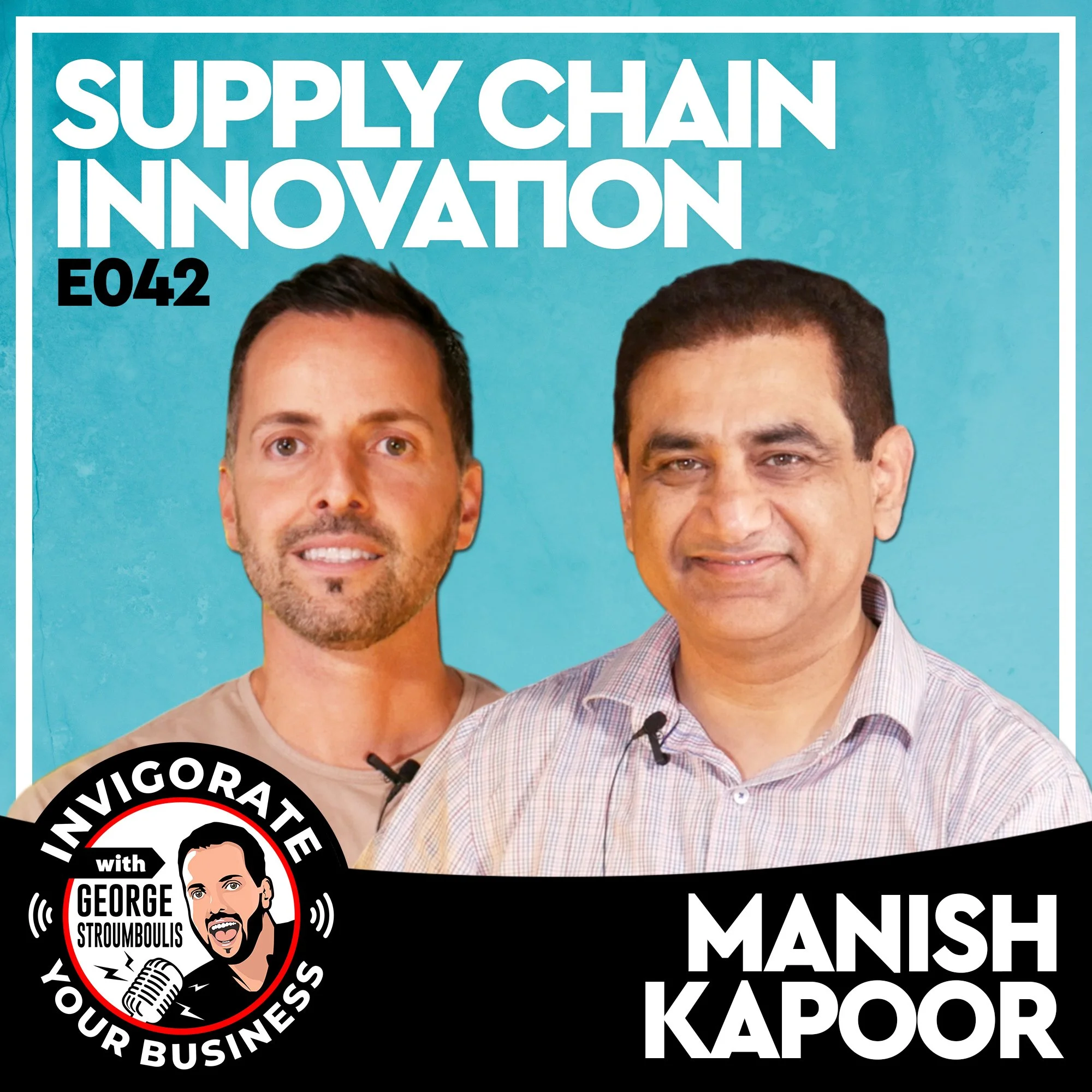
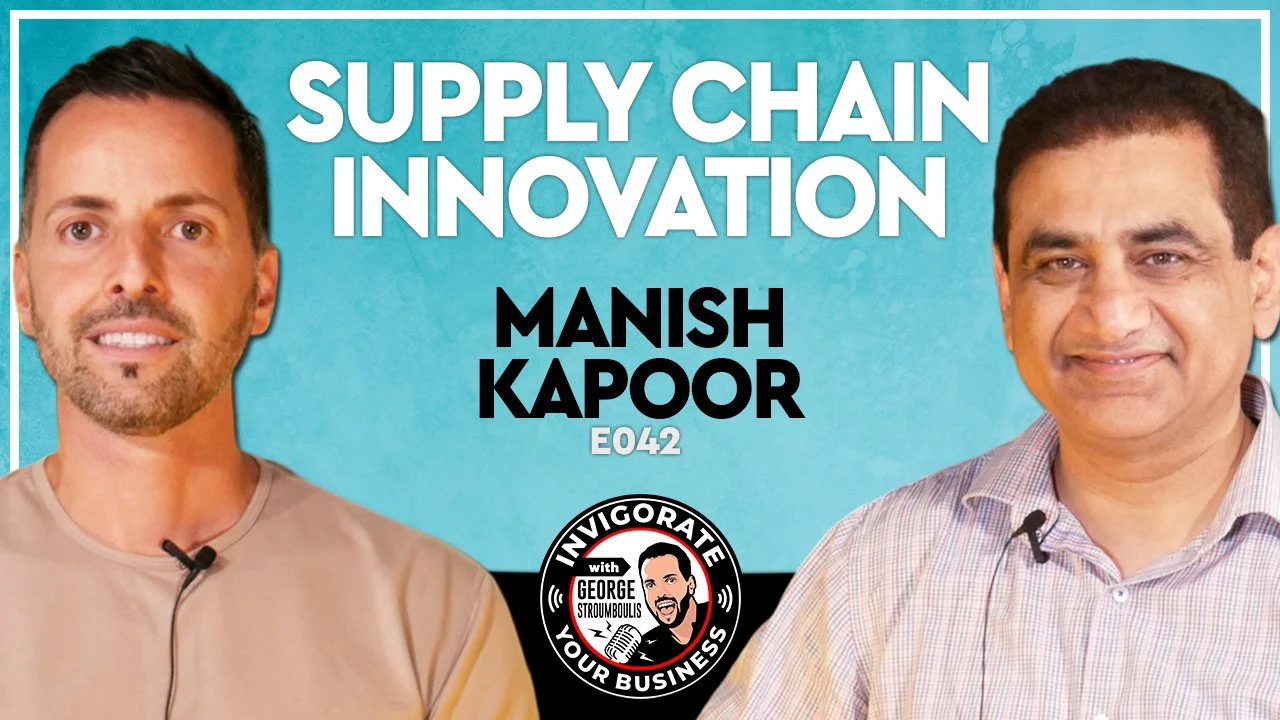
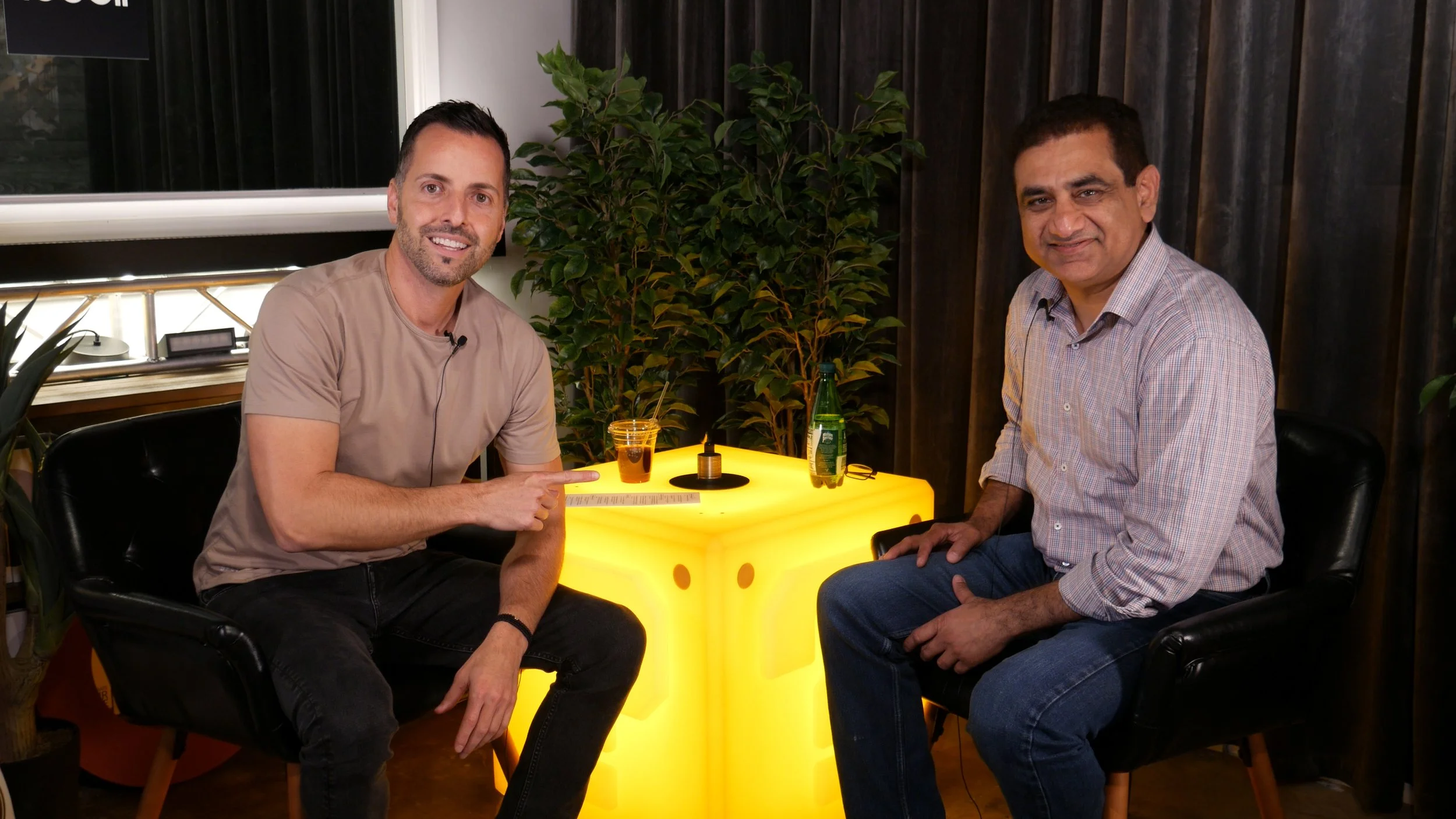
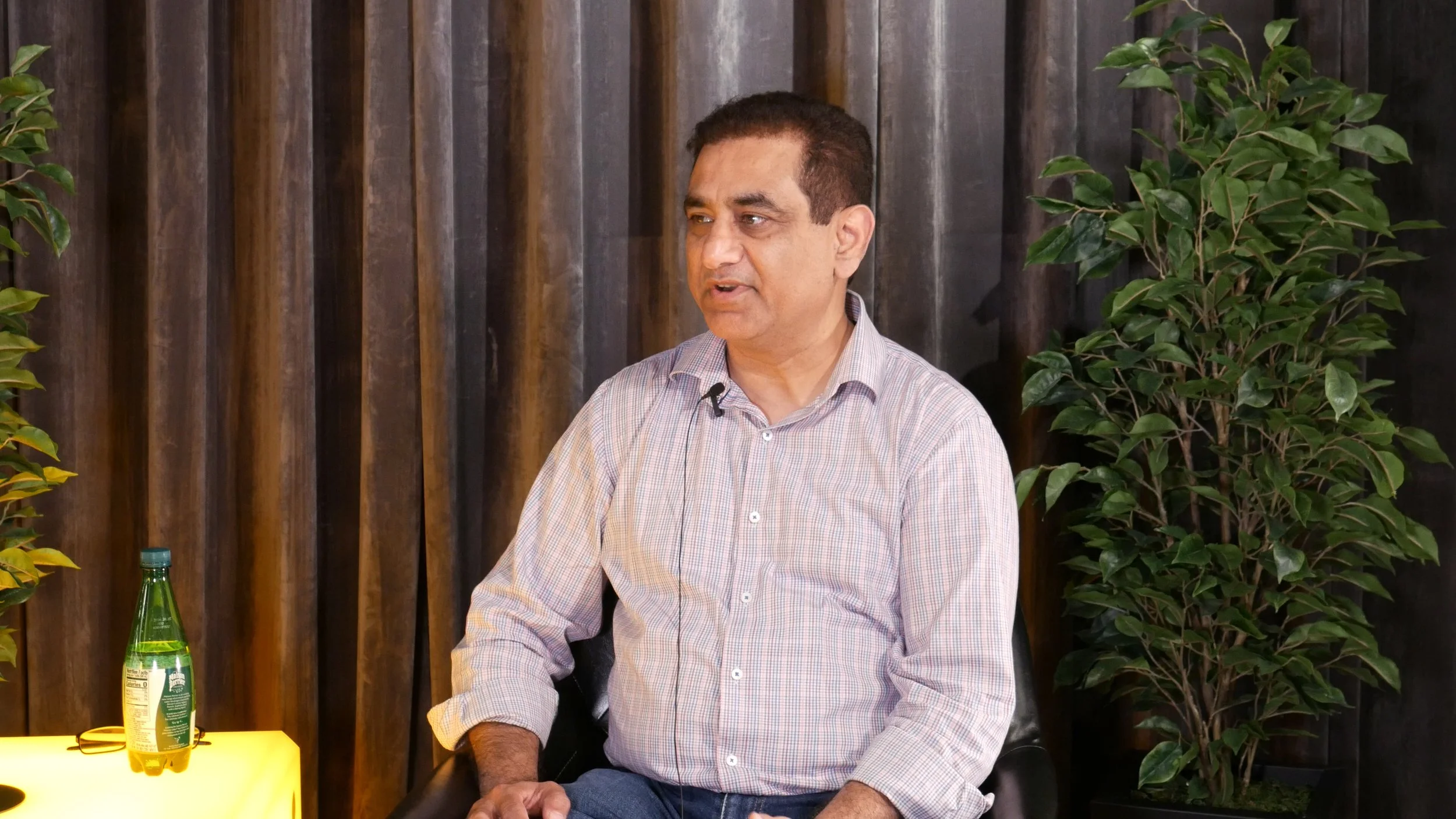
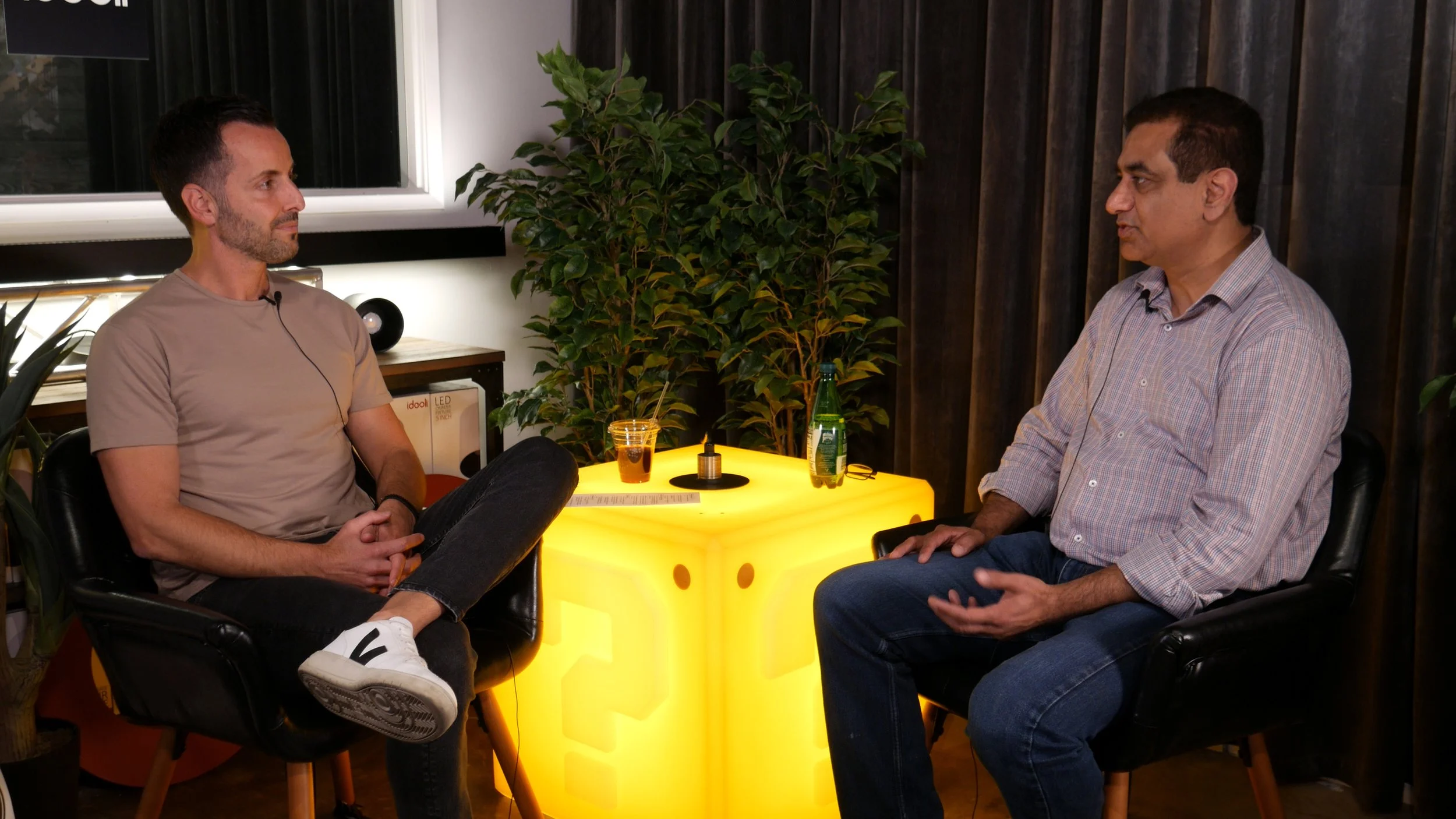
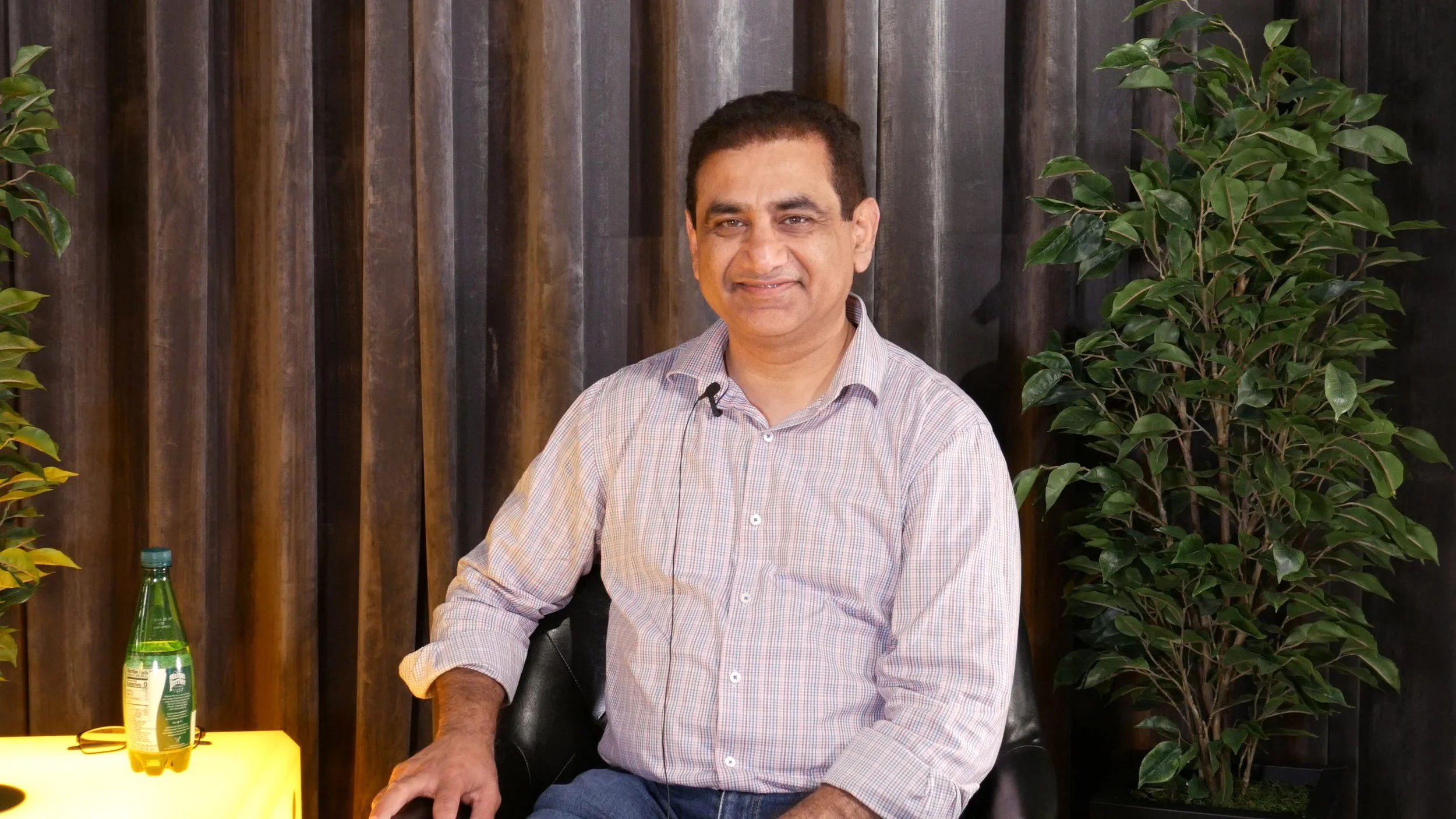
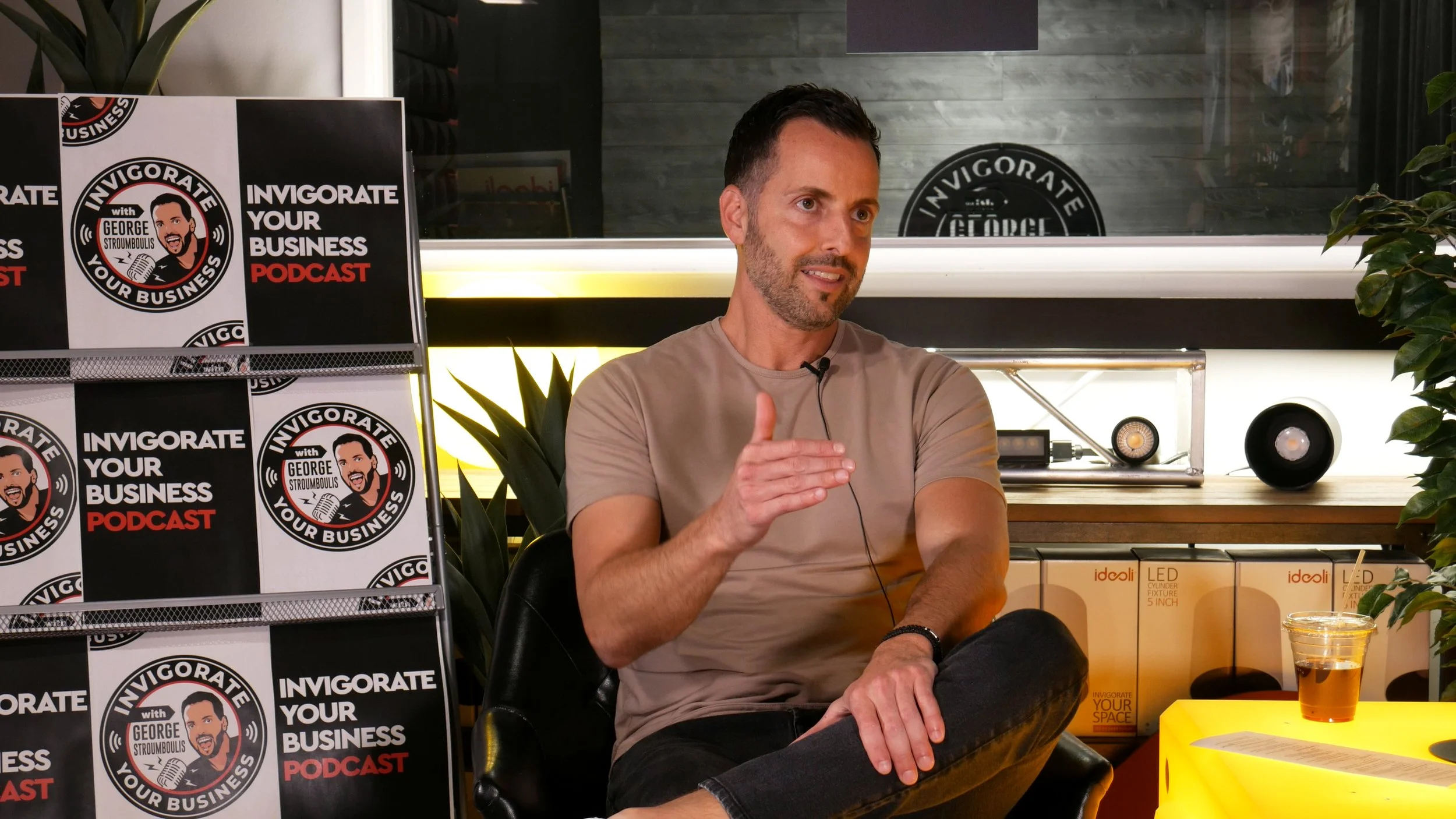
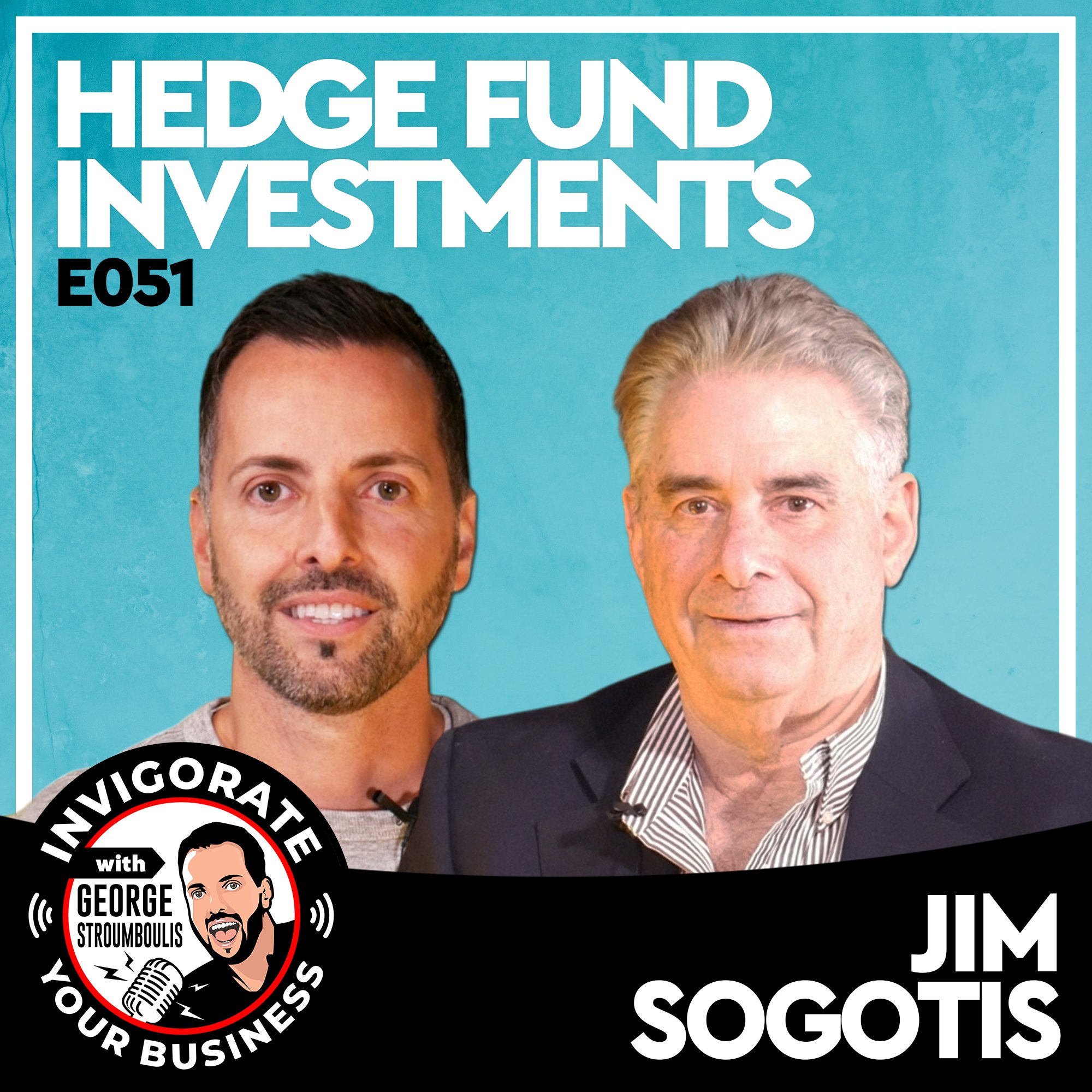
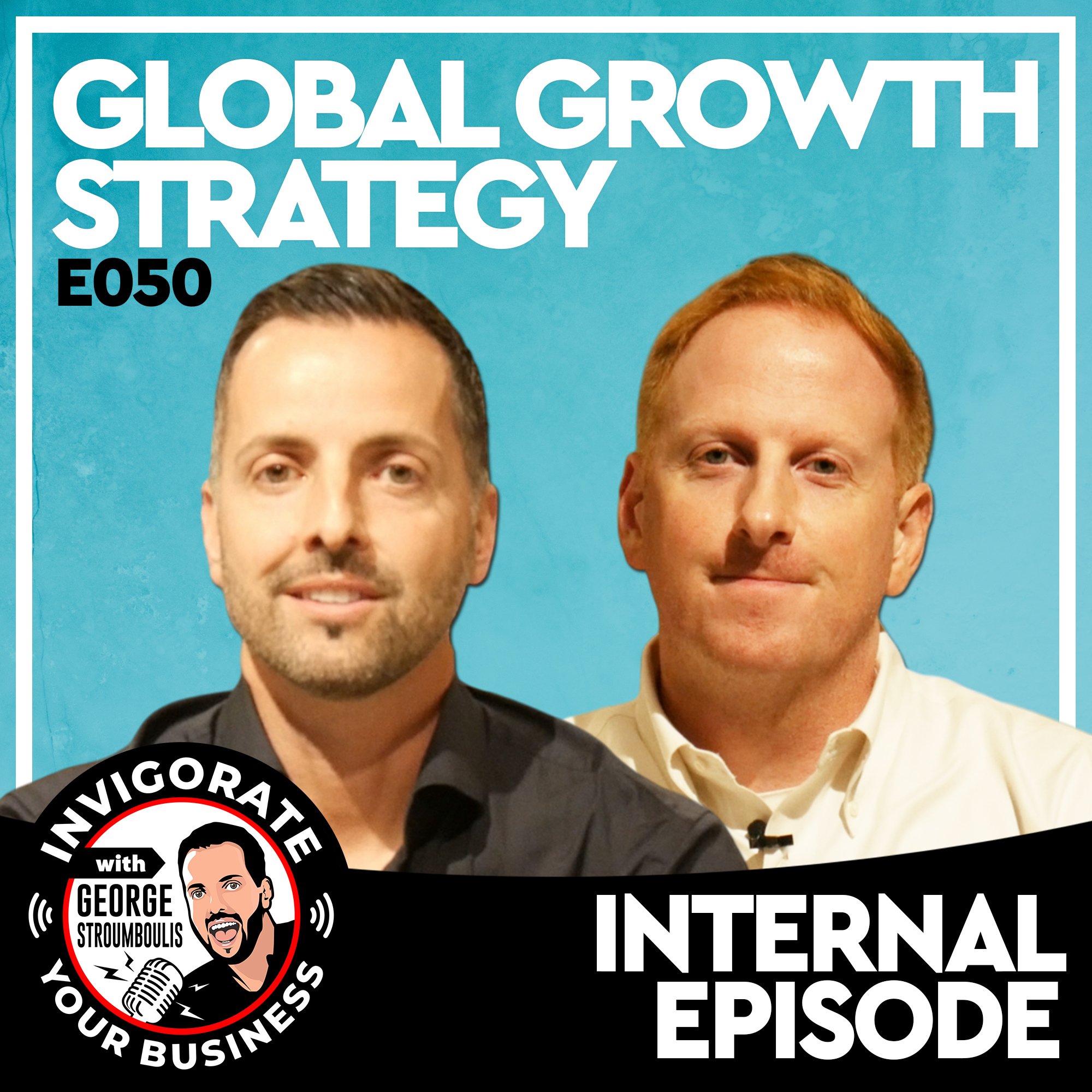


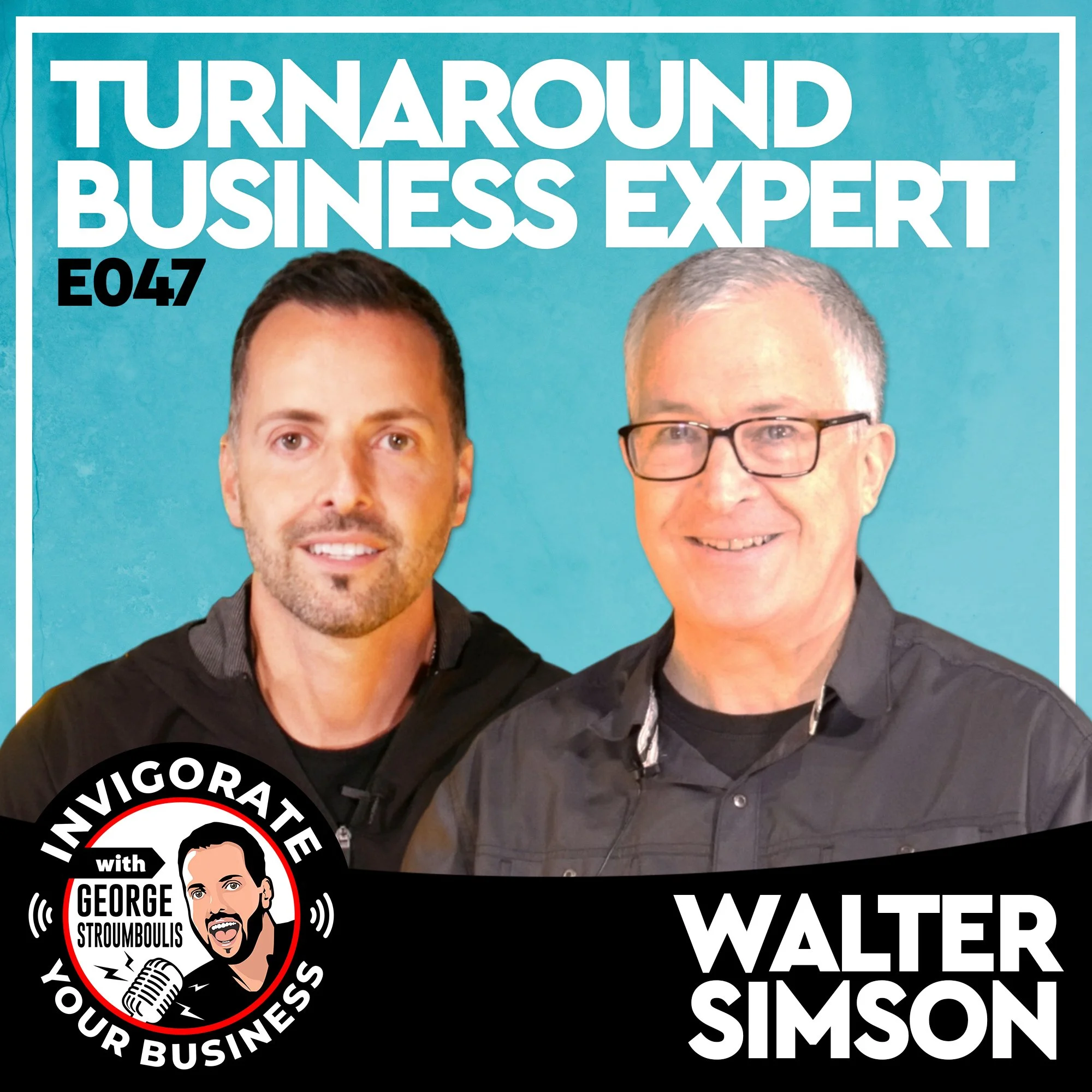
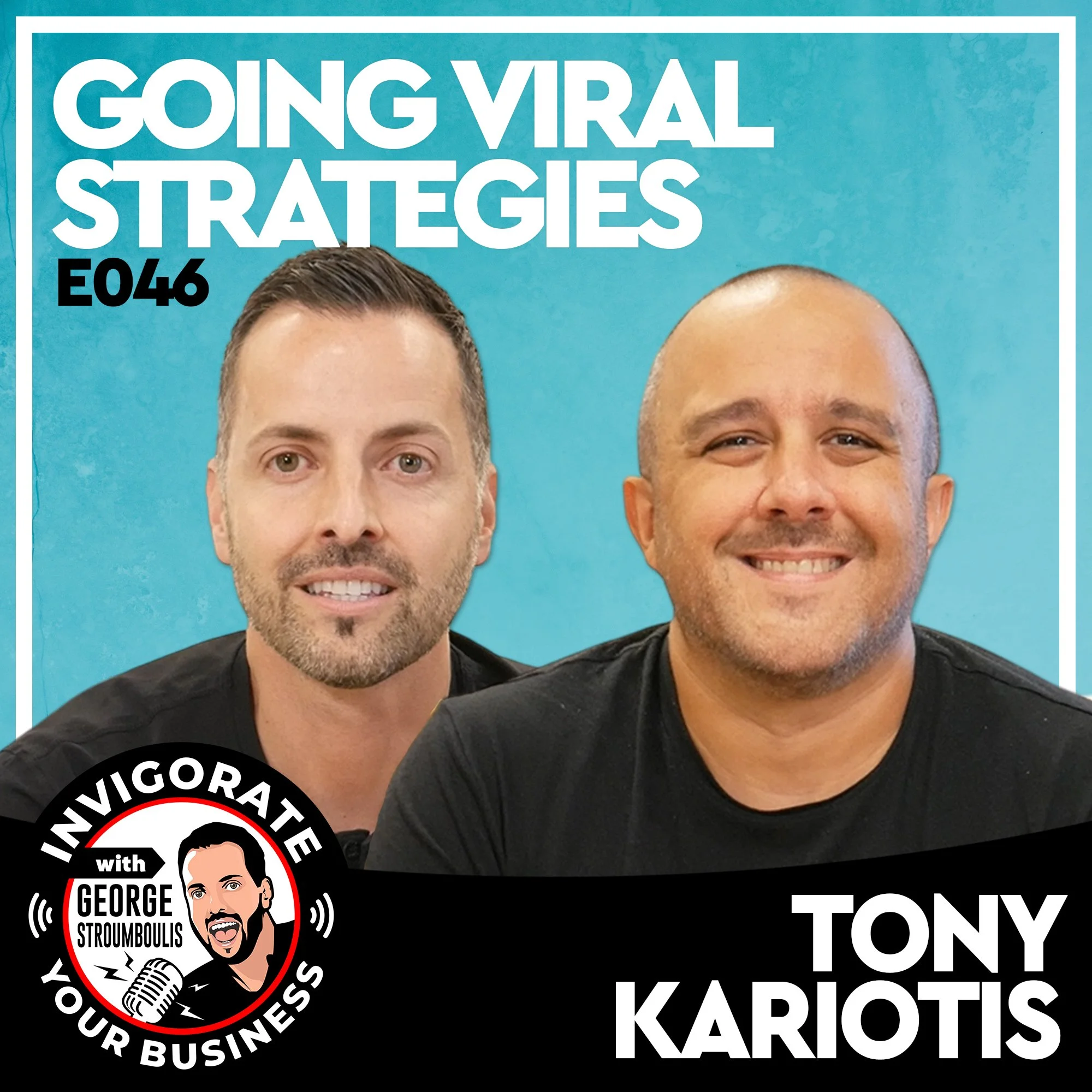

George Stroumboulis sits down with Thanasi Papoulias in Newport Beach, California on the Invigorate Your Business Podcast to talk about all things digital media, social media, influencing, online business strategies, celebrity interactions and so much more.